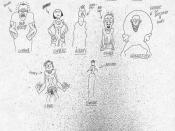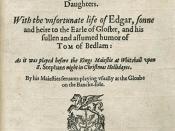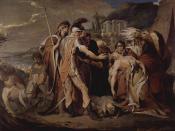Mistakes and undesirable consequences lead humans into redemption, and the rejuvenation of the soul, the cleansing of the spirit comes after a period of misery and pain. In his play King Lear, William Shakespeare creates a story of spiritual blindness, sin, and penalties. Each character including Albany, Edmund, Gloucester, and King Lear suffer from spiritual loss of sight and obtain the intuition to follow the cycle of sin, redemption, and regeneration. A spiritual veil covers the eyes of Albany, Edmund, Gloucester, and King Lear, but as the consequences of spiritual blindness occur, each character wants for salvation.
The various tragedies of life that the characters are subjected to over and over again, in Lear, are probably the effect of higher divinity or power shaping the fate of human action and misfortune.
Albany's need for salvation occurs either early in the play or in the final scene, for Shakespeare leaves the time at which Albany repents ambiguous.
In act three, Albany despises the acts of Goneril, Reagan, and Cornwall and damns the villains for proceedings of unspeakable inhumanity, but Albany allows the horrible events to take place; in contrast, during the final scene, Albany begins to show compassion towards the once neglected characters of Edgar, Kent, and Lear. At the time of his salvation, Albany makes a "show" of redemption by asking for forgiveness in front of nobility (Everett 127). Albany suffers the least severe consequences and ultimately survives the "battle" while Edmund, Gloucester, and Lear succumb to death after redemption. Unlike Edmund, Albany's cycle of sin and redemption ends not in fatality.
In contrast to Albany, Edmund waits until the final moment to make amends. With his final minutes, Edmund tries to prevent Cordelia and King Lear's condemnation to death. Fearfully Edmund speaks, "I pant for life; some good I...


